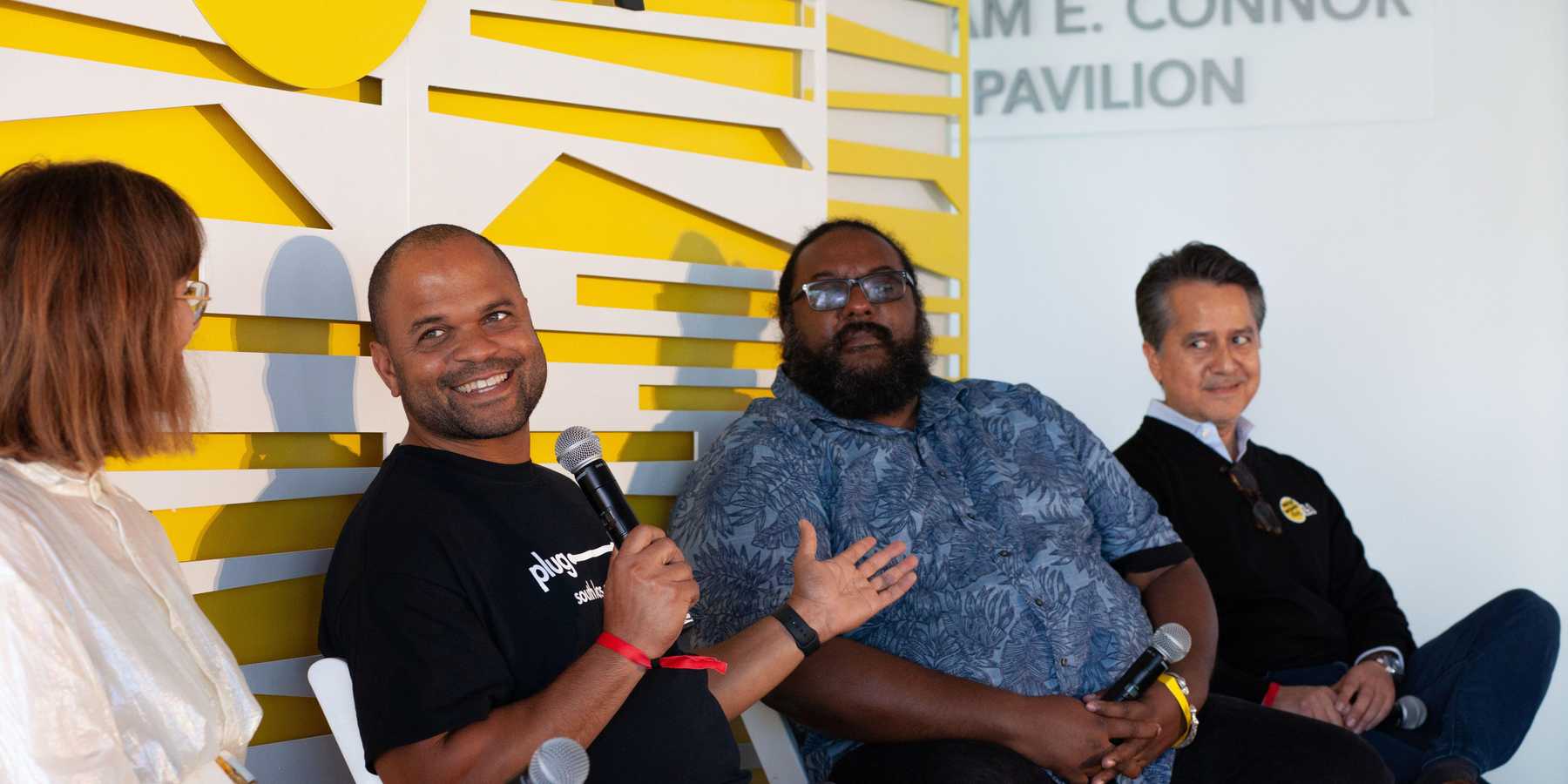

Get in the KNOW
on LA Startups & Tech
XThe Lithium Race Takes Shape in the Salton Sea
David Shultz
David Shultz reports on clean technology and electric vehicles, among other industries, for dot.LA. His writing has appeared in The Atlantic, Outside, Nautilus and many other publications.
Located roughly a hundred miles east of San Diego, the Salton Sea is California’s largest landlocked body of water, for now.
Measuring 5 miles across and 35 miles long in its current form, the lake was created by diverting water from the Colorado River into the region for agricultural purposes. Once a vacation destination renowned for its wildlife and wetlands, a series of environmental mishaps and mismanagement have left the lake toxically salty, shrinking and often malodorous. Conditions have gotten so bad that Palm Springs Life Magazine called the region’s transformation “the biggest environmental disaster in California history” in March of 2020.
But against this unlikely backdrop, new life—or at least new industry—is scrambling to set up shop in the region. The Salton Sea, it turns out, is rich with lithium, an element that has taken center stage in the world’s transition to clean energy and its ever-growing demand for batteries. From smartphones to electric vehicles, there’s a pretty good chance that the last battery you used had lithium ions inside. Prices for the metal reached an all time high in September, and futures are up more than 400% since the start of 2021. With Biden’s new economic policy outlined in the Inflation Reduction Act, there are strong financial incentives to move battery production back to North America.
If that’s going to happen the Salton Sea could very well become the lithium capital of North America, or to paraphrase Governor Gavin Newsom, the region could become the “Saudi Arabia of lithium,” and the players are already starting to assemble.
Currently, there are three companies attempting to set up plants in the Salton Sea for direct lithium extraction: EnergySource Minerals, Controlled Thermal Resources and BHE Renewables, a branch of Berkshire Hathaway. All three companies have similar business strategies from a high level, all of which involve geothermal power plants. These plants, which are common in many parts of the world, draw hot, salty water from deep in the ground to create steam which drives a turbine to produce electricity. What makes the Salton Sea so special is that its geothermal brines just happen to contain lithium.
In a 2017 study, researchers from the U.S. DOE Office of Energy Efficiency and Renewable Energy analyzed more than 2,000 samples of geothermal fluid from U.S. sources and found that only 1% had significant lithium concentration. This rare confluence of geothermal activity and lithium presence provides an opportunity for companies to generate electricity and mine lithium simultaneously.
Beyond their marriage of geothermal energy and lithium extraction, the three companies begin to diverge.
According to former dot.LA engagement editor Luis Gomez — whose newsletter Lithium Valle, is essential reading on this topic — EnergySource seems to be out in front early.
“They claim to have the technology that’s patented, they claim to have done the research, they claim to have the funding, and they claim they're ready to go and start production,” says Gomez. “They are kind of considered the canary in the coal mine.”
According to a report from the United States Department of Energy, EnergySource plans to eventually scale production up to over 20,000 metric tons of lithium hydroxide per year using its proprietary Integrated Lithium Adsorption Desorption technology.
Construction on the plant was slated to start earlier this year, but has been delayed. EnergySource has said publicly that lithium production might begin in the second quarter of 2024, but it’s unclear whether this date will also be pushed back. The company has a long history of operating in the region, having run the John L. Featherstone geothermal plant since 2012. The new venture into lithium would leverage that same plant, but without more details about how their proprietary technology works, there’s not much to do but wait and see.
One potential problem facing all three lithium extraction companies is that the Salton Sea geothermal brines are not the same as the brines in evaporation ponds similar to those in Argentina, Chile and Bolivia, where more than half of the world’s lithium is produced. Specifically, the deep geothermal brines in the Salton Sea contain more silica and transition elements, which may complicate the chemistry of purifying the lithium. Still, many researchers are extremely bullish on the prospect of tapping into these reserves. Alex Grant, The Principal at Jade Cove, a research organization focusing on direct lithium extraction technologies, says that much of the skepticism surrounding the technology can be attributed to competing financial interests that are trying to squash the nascent tech’s potential in favor of an established method.

Lithium Mines in the Atacama Salt Flats, Chile from an altitude of 15km via Google Earth. The facility is about 10km wide.
Google Earth
For its part, BHE Renewables, operating as CalEnergy, runs a fleet of 10 geothermal plants in the Imperial Valley. The company had previously announced its intent to set up a direct lithium extraction demonstration plant sometime before the end of 2022 to assess the viability of lithium extraction. If that pilot program goes well, the company could build a commercial-scale facility as early as 2026 with a projected annual capacity of 90,000 metric tons of lithium.
Obviously, having the backing of Berkshire Hathaway comes with advantages and capital. Add into the equation another $15 million in DoE grant money obtained last winter, and BHE appears to be well positioned as a major player in the long term.
Finally, there’s Controlled Thermal Resources. As the only company not already operating a geothermal business in the region, CTR is something of an outsider and dark horse. By 2024, the company hopes to build both a geothermal energy plant and a direct lithium extraction plant to operate in parallel, projecting a capacity to extract 300,000 metric tons of lithium carbonate equivalent annually by 2030. As dot.LA previously reported, Controlled Thermal Resources has partnered with Statevolt, a company that intends to build a $4 billion gigafactory nearby that will run on power from CTR’s geothermal plant and make batteries from the lithium it extracts. It’s a beautiful closed-loop business model. But again, all of this relies on the direct lithium extraction technology, and details are scant.
According to Gomez, despite the typically cut-throat nature of the energy industry, the relationship between the three upstarts in the Salton Sea is often surprisingly cooperative at the moment.
“They want the others to succeed because it kind of gives them the confidence that their technology is also eventually going to succeed,” he says. “It gives confidence to investors.”
Which is all to say, there may well be space for all three companies if the technology is as solid as they claim. If that’s the case, the Salton Sea and its surrounding region may have yet another miraculous transformation up its sleeve.
From Your Site Articles
- EV Battery Maker Statevolt Is Embracing a 'Buy Local' Ethos - dot.LA ›
- EV Battery Maker's Plans Gigafactory in Imperial Valley - dot.LA ›
- Statevolt Joins Lithium Race In Salton Sea - dot.LA ›
- The US Needs A lot More Lithium Before The Switch to EVs - dot.LA ›
- Why Are Lithium Prices Falling? - dot.LA ›
Related Articles Around the Web
David Shultz
David Shultz reports on clean technology and electric vehicles, among other industries, for dot.LA. His writing has appeared in The Atlantic, Outside, Nautilus and many other publications.
Meet the 10 Startups in Techstars' 2021 Space Accelerator Class
07:00 AM | June 08, 2021
Techstars' Space Accelerator took off this week with its third class of space-related companies that make everything from AI-powered smart cameras to technology that can anticipate celestial collisions.
The 10 startups selected for the competitive four-month program are based across the U.S. and Australia and will work with Techstars on a mostly remote basis.
All are developing technology with multiple uses in space and will receive a $120,000 investment in addition to access to Techstars' expanding network of mentors.
That network includes aerospace experts at the Pasadena-based NASA Jet Propulsion Laboratory. Participating companies include Lockheed Martin, Arrow Electronics, SAIC and Israel Aerospace Industries.
"Alumni from our previous cohorts are launching space systems and infrastructure, raising tens of millions of dollars in venture capital as well as receiving lucrative contracts from both government and commercial customers," said Jonathan Fentzke, the program's managing director.
The program will culminate in a demo day on Sept. 2 where the startups will show off their work in hopes of winning potential investors or clients.
Fentzke noted that while no companies in this year's cohort are based in LA, Techstars still has partners mentors and investors based here.
"As it turns out the four companies in California out of 10 are not based in L.A. today, but will likely have a presence over time," Fentzke told dot.LA.
Here's a look at the 10 companies selected for this year's Techstars Space Accelerator.
Hyperkelp
LOCATION: San Clemente, Ca.
CEO: Graeme Rae
Founded by maritime engineer Dr. Graeme Rae, Hyperkelp is building buoys that aren't your average fishing bobber. Its tech can collect and transmit data about the surrounding ocean and incoming payloads from space. The company says its goal is to create a network of the buoys around the ocean to help aerospace launch companies stream data from anywhere around the world.
Hyperspec.ai
LOCATION: San Francisco, CA. and Tel Aviv, Israel
CEO: Ohad Levi
Hyperspec.ai makes smart cameras that run on artificial intelligence. The company's CEO Sravan Puttagunta previously worked in HP's engineering department. In a nutshell, Hyperspec's cameras are made to create accurate mapping and object tracking in real time, with the goal of being used on self-driving cars and other autonomous vehicles.
Nicslab
LOCATION: Sydney, Australia
CEO: Dr. Andri Mahendra
Nicslab develops technology called the "source measurement system" that uses quantum computing to help organizations optimize their internet speeds and make them faster. Its current clients include the University of Oxford, HP Labs and Mitsubishi Electric.
Pierce Aerospace
LOCATION: Indianapolis, In.
CEO: Aaron Pierce
Pierce Aerospace makes software that helps autonomous drones identify objects and payloads. It argues that this software is critical to the development of the drone industry -- after all, it can be pretty scary if a drone goes rogue because it can't see where it's going. In 2019 the company received a roughly $50,000 grant from the U.S. Department of Defense to continue work on its flagship product, the Flight Portal ID system, which the DoD wants to use on its Unmanned Aircraft Systems.
Pixspan
LOCATION: Rockville, MD.
CEO: Michael Rowny
Pixspan develops a system that lets large files be transferred from different storage locations (like hardware or the cloud) at rapid speeds -- sometimes up to 5 times faster than average, it reports. It's compatible with several app programming interfaces, the main one being Amazon Web Services.
QuSecure
LOCATION: San Mateo, Ca.
CEO: Dave Krauthamer
QuSecure is a security company that focuses on protecting government and corporate systems from hacks. Specifically, its software works to keep encrypted data from being stolen and decrypted by quantum computers, which can steal and read valuable information at rapid speed. Its customers include Google and Amazon.
SCOUT
LOCATION: Alexandria, Va.
CEO: Eric Ingram
Scout -- also known as Scout Space -- develops software that helps spacefaring companies visualize what's going on in the great beyond and avoid casualties, like crashes with other spacecraft, satellites or debris. The company was founded in 2019 and says its name is an acronym for helping Spacecraft Observe and Understand Things around them.
SeaSatellites
LOCATION: San Diego, CA.
CEO: Mike Flanigan
As the name suggests, SeaSatellites is building unmanned vessels that work as satellites for the ocean and have a wide array of potential uses, from environmental data collection to communications. Similar to their skyward counterparts, SeaSatellites' tech can be controlled from anywhere and are designed to carry payloads on long missions.
Xairos
LOCATION: Denver, CO.
CEO: David Mitlyng
This company's name is Greek to us -- literally. A nod to the Greek god of opportune time, Kairos, is an appropriate name for this startup using quantum mechanics to bring GPS-type technology to areas of the globe without internet access.
Thermexit
LOCATION: Boston, MA.
CEO: Katie Willgoos
Thermexit is the only company in this year's Space Accelerator cohort that's led by a woman. CEO Katie Willgoos joined the company in March and helps the company create and sell its main product, Theremexit Pads, which are tiny thermal sensing sticky pads that can be placed on circuit boards and inside computers.
Correction: An earlier version of this post stated this is Techstars' second space accelerator cohort. It's the accelerator's third such class. It also, misnamed the CEO of Hyperspec.ai.
From Your Site Articles
- Techstars Starburst Space Accelerator Demo Day is Wednesday ... ›
- New Techstars Anywhere Accelerator Class has LA Company - dot.LA ›
- Here is Techstars' Starburst Space Accelerator Class - dot.LA ›
- Event: Demo Day For The Long Beach Accelerator's 2nd Cohort - dot.LA ›
- Techstars Gears Up for Its 2021 Los Angeles Startup Showcase - dot.LA ›
- Kairos Ventures’ Alex Andrianopoulos on Investing in Academia - dot.LA ›
- These SoCal Startups Get Ahead of the Game Via Comcast’s Sports Tech Accelerator - dot.LA ›
- Long Beach Accelerator Set to Welcome Fourth Group of New Companies - dot.LA ›
- NASA’s Space Accelerator Program Lifts Off - dot.LA ›
Related Articles Around the Web
Read moreShow less
aerospacetechstars space acceleratorartificial intelligenceaispacenasahyperkelphypersec.ainicslabpierce aerospacepixspanqusecurescoutseasatellitesxairosthermexit
Samson Amore
Samson Amore is a reporter for dot.LA. He holds a degree in journalism from Emerson College. Send tips or pitches to samsonamore@dot.la and find him on Twitter @Samsonamore.
https://twitter.com/samsonamore
samsonamore@dot.la
dot.LA Summit: VC-led Diversity and Inclusion Initiatives Still Need More Funding
06:00 AM | October 26, 2022
Photo by David Ruano
In 2021, women raised just 2 percent of venture capital in the US in 2021. Black founders raised just 1.2 percent of total VC funds last year — and will likely raise even less this year amidst the economic downturn. This is all to say that efforts from VC funds to invest in female and racially diverse founders don’t appear to be enough.
So what more can be done to create equity in the world of venture capital? In a panel at the dot.LA Summit, LA-Tech.org’s Ko Trinidad-Williams spoke to the heads of a number of diverse VC funds about solutions for creating more inclusive organizations.
Marcos Gonzalez, the founder of LA-based VamosVentures, urged firms to build a pipeline of diverse talent —— from intern level to mid-level positions to partner. Recruiting diverse candidates at all levels will ensure that firms will be able to move people into seats that “have a say” on what type of deals they look at and the amount of funding. “Those networks are a critical part of creating equity,” Gonzalez added.
Merely recruiting diverse candidates for internships isn’t, however, enough. “It’s not about that internship,” said Derek Smith of Plug In South LA, which aims to build out the tech ecosystem in South Los Angeles. “It’s about converting that internship into a job, and then converting that job into a professional career, and then converting that career into an entrepreneurial endeavor.”
Stuart McCalla of Evolution, a leadership coaching firm, said organizations have to figure out what internal changes need to happen to draw more diverse candidates.
For example, VamosVentures, which focuses on LatinX and diverse funders, has seen increased interest from aspiring entrepreneurs in recent years. “In 2015, I travelled the country and found about 200 deals led by Latino founders that I thought were VC-backable,” said Gonzalez. This year, the firm has over 1500.
Even as recently as five years ago, Gonzalez said it was rare to find Latino-led firms that have raised over $5 million in funding. Now, every firm in VamosVentures’ portfolio has done that.
Gonzalez’s firm also offers help to founders who didn’t quite make the cut, either offering founders constructive feedback or connecting them with people who could aid their company’s growth. “What bothered us ins that when we looked at 100 companies and invested in two, we had to say no to 98 of them,” Gonzalez said.
Aisling Carlson of Diversity VC, which researches diversity in the VC industry, agreed that while there’s been an uptick in women and founders from minority backgrounds receiving funding — the total amount is still “orders of magnitude” smaller than what goes to white male founders.
Even funders that have launched “diversity, equity and inclusion” initiatives have diverted a tiny fraction of resources to those efforts. “We’re talking about an average fund size of $250 million for your more homogenous funds and $20 million for your DEI (diversity, equity and inclusion) fund,” said Carlson. “So that difference is just so big, and as much as we should be saying, ‘Oh, this is great progress’, it’s just not enough.”
From Your Site Articles
- Dot La Summit - dot.LA ›
- VamosVentures Doubles Down on Backing Latinx Founders - dot.LA ›
- Vamos Ventures' Marcos Gonzalez on Investing in LA's Future - dot.LA ›
Related Articles Around the Web
Read moreShow less
diversitydiversity in techdiversity in vcdot.la summitequity and inclusionvamos venturesventure capitalwomen in techwomen in vc
Amrita Khalid
Amrita Khalid is a tech journalist based in Los Angeles, and has written for Quartz, The Daily Dot, Engadget, Inc. Magazine and number of other publications. She got her start in Washington, D.C., covering Congress for CQ-Roll Call. You can send tips or pitches to amrita@dot.la or reach out to her on Twitter at @askhalid.
https://twitter.com/askhalid
RELATEDTRENDING
LA TECH JOBS


